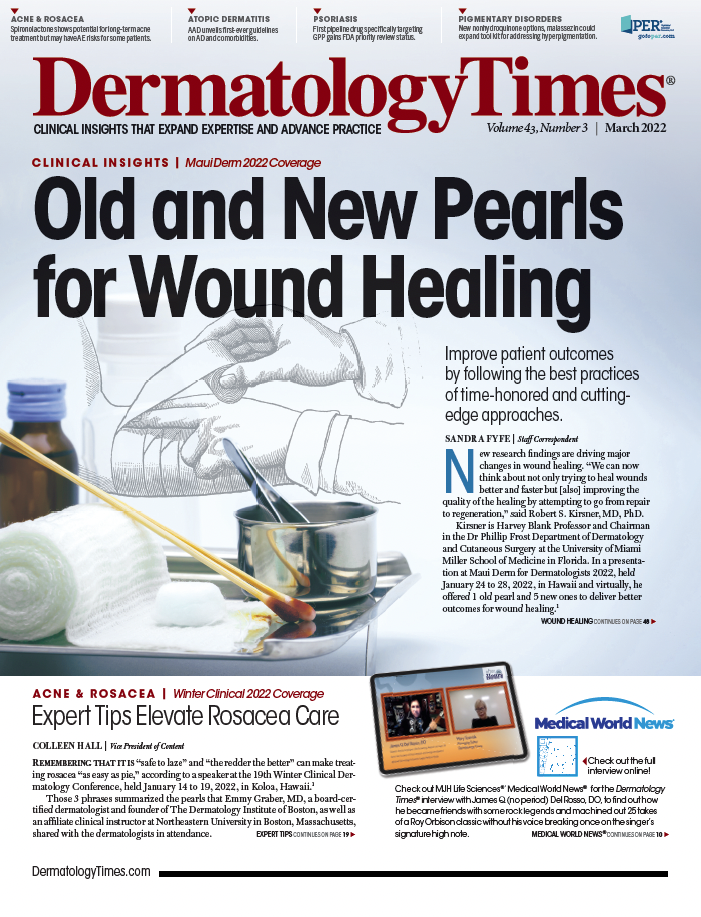- Case-Based Roundtable
- General Dermatology
- Eczema
- Chronic Hand Eczema
- Alopecia
- Aesthetics
- Vitiligo
- COVID-19
- Actinic Keratosis
- Precision Medicine and Biologics
- Rare Disease
- Wound Care
- Rosacea
- Psoriasis
- Psoriatic Arthritis
- Atopic Dermatitis
- Melasma
- NP and PA
- Skin Cancer
- Hidradenitis Suppurativa
- Drug Watch
- Pigmentary Disorders
- Acne
- Pediatric Dermatology
- Practice Management
- Prurigo Nodularis
- Buy-and-Bill
Publication
Article
Dermatology Times
I Meant to Code Correctly; Now Could I Go to Jail?
Author(s):
In this month's Legal Eagle, David J. Goldberg, MD, JD, discusses the legal complexities of incorrect medical coding.
Dr Skin has been a successful dermatologist for decades, practicing almost 100% medical dermatology. Upon enter- ing the twilight of his career, he brought on new associates who wanted to expand the medical and cosmetic horizons of his office.
The associates persuaded him to buy an intense pulsed light (IPL) source, which they claimed could be used for vascular lesions, pigmented lesions, facial rejuvenation, and unwanted hair. Skin was happy to see his investment in new technology working out.
Unfortunately, a year after the purchase, the younger associates had either left his practice or were less interested in using IPL. Skin had taken out a 5-year loan to pay for the device but no longer had any substantive revenues coming from its use. At a virtual conference held early in the pandemic, Skin learned that when IPL is used to treat photodamaged skin, it sometimes also clears actinic keratosis (AK).
During the past 2 years, Skin used his IPL to treat virtually every patient with AK and coded for a medical destructive treatment. Both Medicare and non-Medicare patients were treated in this manner, generating hundreds of thousands of dollars in extra revenue for Skin. Ultimately, both private carriers and his Medicare carrier, by way of the US Department of Justice (DOJ), audited his medical records and accused Skin of fraudulently using medical-based coding for cosmetic IPL procedures.
Skin now seeks legal help. His attorney advises him that if he is found guilty of commit- ting fraud, he faces civil penalties as well as possible jail time. Is this true?
Both the DOJ and Skin find experts to support their views. The DOJ expert main- tains that IPL devices are sold by the aesthetics industry and used by providers for cos- metic purposes. Furthermore, the DOJ expert argues, there are numerous more effective ways to treat AK, including cryotherapy, topical chemotherapeutic agents, and photodynamic therapy. He contends that IPL treatment is not the standard of care for AK.
Skin brings an expert who argues that both US and European data show that IPL treatment can lead to improvement in AK. This expert argues that although IPL is not usually used to treat AK, it can be considered an alternative modality consistent with the standard of care.
Which expert is correct?
The standard of care is not necessarily derived from some well-known textbook, nor is it articulated by any judge. The standard of care is defined by some as whatever an expert witness says it is and what a jury will believe.A case against any medical specialist involves the following critical considerations:
- The specialist must have the knowledge and skill ordinarily possessed by a specialist in that field.
- That specialist must have used that care and skill in the same field and in the same or similar locality under similar circumstances.
- Failure to fulfill such duty may represent a breach in the standard of care.
If the jury accepts the suggestion that Skinfraudulently coded, then he will be liable. Con- versely, if the jury believes an alternative view— that the standard of care is a pragmatic concept, decided case by case and based on the tes- timony of the physician and the experts—then there will be no liability.
It is important to note that where there are 2 or more recognized ways to treat a condition, a physician does not fall below the standard of care by using any of the acceptable methods, even if one method turns out to be less effective than another.
In many jurisdictions, an unfavorable result due to an “error in judgment” by a physician is not alone a violation of the standard of care if the physician acted appropriately prior to exercising professional judgment.
With expert opinions on both sides, it will be up to a jury to decide whether Skin committed fraud in his coding. If they determine that he did, he may lose his medical license and face jail time.







